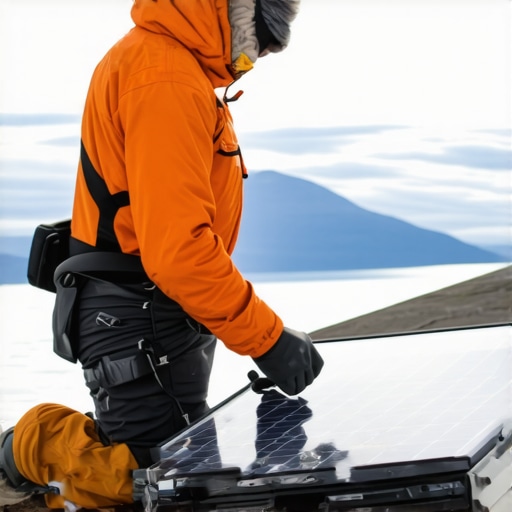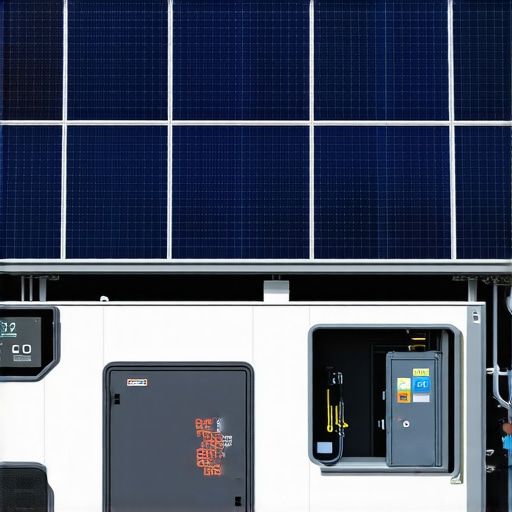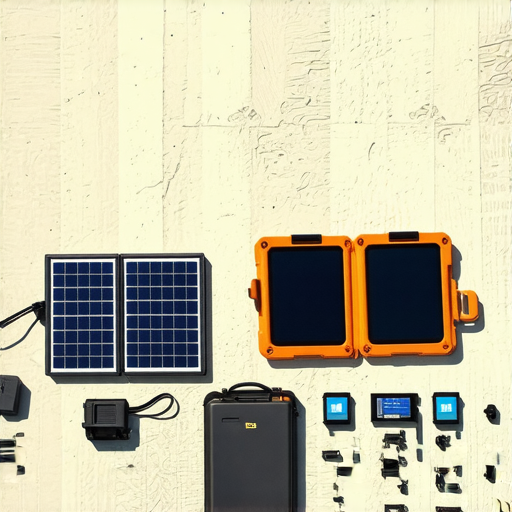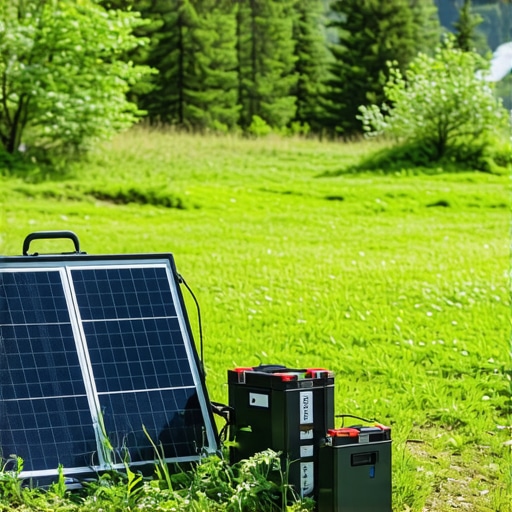Discovering the Magic of Off-Grid Solar Power: My Personal Experience
Several years ago, I decided to embrace a more sustainable lifestyle by moving off the grid. My initial motivation was to reduce my carbon footprint and enjoy the freedom of energy independence. I vividly remember setting up my first portable solar panel, feeling a mix of excitement and curiosity about how this technology could change my daily life. That first step into off-grid living opened my eyes to the incredible potential of solar power, especially with the innovative kits now available for 2025.
Why I Switched to Portable Solar Energy Solutions
Living off-grid meant I needed reliable, efficient, and easy-to-transport energy sources. I began exploring various solar power kits designed for portable use, and I was surprised by how far the technology had come. Modern portable solar panels now feature high efficiency, lightweight materials, and user-friendly setups. These innovations made my transition smoother and more enjoyable, giving me the confidence to rely on solar energy even in remote locations.
Choosing the Right Solar Power Kit: What Matters Most to Me
When selecting a solar kit, I prioritized durability, capacity, and portability. I wanted a system that could handle cloudy days, be easily packed for trips, and provide enough power for my essentials. After extensive research, I found that top solar power kits for 2025 are packed with cutting-edge features like smart energy management and expandable batteries. These kits have transformed my off-grid experience, allowing me to power everything from lights to small appliances seamlessly.
What Makes Portable Energy Solutions a Game-Changer?
Portable solar generators have become my trusted companions during camping trips, outdoor adventures, and even emergency situations. Their compact design and high capacity mean I can generate and store energy anywhere. For example, I often rely on portable solar generators to keep my devices charged in remote locations. The convenience and independence they offer are truly unparalleled, especially with the latest models that combine power, portability, and affordability.
Ever Wondered How These Kits Will Evolve by 2025?
Given the rapid advancements in solar tech, I believe that by 2025, we’ll see even more efficient, lightweight, and affordable off-grid solar solutions. Companies are investing heavily in research to improve energy density and integration with smart home systems. For detailed insights, I recommend reading the ultimate guide to solar power kits, which covers upcoming trends and innovations.
If you’re considering making the switch to off-grid solar, I’d love to hear about your plans or experiences. Drop a comment below or share your journey — together, we can embrace a cleaner, more independent energy future!
Innovative Trends Shaping Off-Grid Solar Power by 2025
As an enthusiast and seasoned observer of solar technology, I’ve seen firsthand how rapidly the off-grid solar landscape is evolving. The push toward smarter, more efficient energy solutions is driven by advancements in materials science, digital integration, and user-centered design. For example, emerging perovskite solar cells promise higher efficiency and lower costs, potentially revolutionizing portable solar options (U.S. Department of Energy). These innovations will likely make off-grid solar more accessible and reliable, even in challenging environments.
How Will Smart Integration Transform Off-Grid Solar Systems?
With the proliferation of IoT and smart home technologies, future solar kits won’t just generate and store energy—they’ll intelligently manage it. Imagine solar panels equipped with sensors that optimize output based on weather forecasts or energy demand, and batteries that communicate seamlessly with your devices for real-time management. This integration enhances efficiency and extends the lifespan of your system, reducing maintenance and operational costs. For those interested in exploring cutting-edge options, check out the ultimate guide to solar power kits for upcoming innovations.
What Practical Challenges Should Experts Prepare For?
Despite the promising outlook, several challenges remain. Climate variability, system scalability, and cost barriers can hinder widespread adoption. Proper planning and system design are crucial to mitigate these issues. For instance, integrating expandable battery solutions ensures energy supply during prolonged cloudy periods or high-demand seasons. Additionally, considering the environmental impact of battery recycling and disposal is vital for sustainable off-grid setups. Engaging with trusted sources and staying informed about best practices can help navigate these complexities effectively.
Is There a Way to Balance Cost and Performance Without Compromising Reliability?
Absolutely. Achieving an optimal balance involves selecting modular, scalable systems that can grow with your needs. For example, combining high-quality portable solar panels with smart energy management ensures dependable power without excessive upfront investment. Moreover, leveraging community-based energy sharing models can reduce individual costs while increasing resilience. For further insights into affordable yet robust off-grid solutions, I recommend browsing the top solar generators for off-grid living. These kits exemplify how innovation makes sustainable energy accessible to more people.
Curious about integrating solar solutions into your lifestyle? Share your thoughts or experiences in the comments below, or explore additional reading to deepen your understanding of this transformative technology.
Embracing Complexity: My Personal Journey with Advanced Off-Grid Solar Solutions
As I delve deeper into the world of off-grid solar technology, I realize that the landscape is far more intricate than it appeared during my initial experiments. The leap from basic portable panels to sophisticated, integrated systems demands not only technical understanding but also a nuanced appreciation of environmental, economic, and social factors. For instance, while top solar generators have become more powerful and compact, integrating them seamlessly into my lifestyle required careful planning and adaptation.
Why Personal Experience Reveals Hidden Challenges and Opportunities
My journey has shown me that real-world application exposes challenges often overlooked in product specifications. For example, unpredictable weather patterns—especially in transitional seasons—test the resilience of even the most advanced solar kit solutions. I learned to optimize my system’s performance by incorporating smart energy management and modular battery setups, which allow me to adapt to fluctuating conditions. These insights underscore the importance of flexibility and foresight, emphasizing that technology alone isn’t enough; strategic planning is vital.
How Will Future Innovations Address Practical Limitations?
Looking ahead, I am excited about emerging materials like perovskite solar cells that promise higher efficiency and lower costs (U.S. Department of Energy). These advancements could revolutionize portable solar applications, making them more accessible and reliable even in challenging environments. Additionally, the integration of AI and IoT in solar systems will enable real-time optimization, predictive maintenance, and better resource allocation. This evolution will transform off-grid solar from a niche solution into a mainstream, resilient energy source capable of supporting diverse lifestyles and communities.
Reflecting on Practical Wisdom: Balancing Cost, Performance, and Sustainability
From my experience, achieving an ideal balance involves selecting scalable, modular systems that can grow with your needs, coupled with sustainable practices like responsible battery recycling and environmental impact mitigation. For those contemplating a transition, I recommend exploring affordable yet robust solar panels that offer both reliability and cost-effectiveness. Engaging with community sharing initiatives can also distribute costs and foster collective resilience—an approach I find both practical and empowering.
What Personal Insights Would You Share About Your Solar Journey?
While the technological landscape is evolving rapidly, I believe that sharing our personal stories and lessons learned can accelerate collective progress. Have you faced unexpected challenges or discovered clever solutions? Drop a comment below—I’m eager to hear your experiences and insights. Together, we can navigate the complexities of off-grid solar power and foster a future where sustainable energy is accessible, reliable, and tailored to individual needs.
< }
}
Unlocking the Potential of Modular and Adaptive Solar Systems
As I continue my journey into sophisticated off-grid solar solutions, I’ve come to appreciate the importance of modularity and adaptability. Modern solar power kits now emphasize scalability, allowing users to expand their systems seamlessly, whether by adding extra panels or battery modules. This approach not only optimizes initial investment but also future-proofs your setup against changing energy demands, making it an ideal strategy for both seasoned enthusiasts and newcomers exploring long-term off-grid living.
What Are the Latest Breakthroughs in Energy Storage and Management?
Energy storage remains a critical challenge, especially in unpredictable climates. Recent innovations like solid-state batteries and hybrid energy systems are pushing the boundaries of capacity and longevity. For instance, integrating smart energy management platforms enables real-time monitoring and optimization, significantly extending battery life and system efficiency. According to a recent study published by the U.S. Department of Energy, advancements in perovskite solar cells combined with intelligent storage solutions are poised to revolutionize off-grid applications, making systems more resilient and cost-effective.
How Can Advanced Digital Technologies Enhance Off-Grid Solar Reliability?
Digital integration, especially through IoT and AI, has transformed the landscape. Sensors embedded within panels can predict performance issues before they escalate, while AI algorithms optimize energy flow based on weather patterns and consumption habits. This proactive approach reduces downtime and maintenance costs. For example, systems equipped with predictive analytics can alert users to potential battery degradation, allowing preemptive action. To explore these innovations further, I recommend reviewing the ultimate guide to solar power kits that delves into the integration of smart technologies in off-grid setups.
Is There a Way to Achieve Sustainability While Maintaining Cost-Effectiveness?
Balancing sustainability with affordability is a nuanced endeavor. Employing eco-friendly materials for panels and batteries, alongside effective recycling programs, ensures minimal environmental impact. Additionally, community-based energy sharing initiatives can distribute costs and enhance system resilience. For instance, cooperative setups in remote areas can pool resources, reducing individual expenses while increasing collective reliability. For insights into scalable and sustainable solutions, I suggest exploring the top solar power kits designed for adaptable off-grid living.
What Advanced Techniques Have You Found Effective for Maximizing System Efficiency?
In my practice, employing hybrid configurations that combine multiple energy sources—such as wind and solar—has proven highly effective. Coupled with intelligent load management, these systems adapt dynamically to environmental conditions, ensuring continuous power supply. Additionally, integrating energy storage with bidirectional inverters facilitates energy exchange between different sources and storage units, enhancing overall efficiency. If you’re eager to explore these sophisticated strategies, I invite you to share your experiences or ask questions below, as exchanging insights accelerates our collective mastery of off-grid solar technology.

Things I Wish I Knew Earlier (or You Might Find Surprising)
Embracing Flexibility Over Perfection
When I first started exploring off-grid solar solutions, I believed that having the most powerful system was the key. Now I realize that flexibility and scalability are more crucial. A modular setup allows you to adapt to changing needs and environmental conditions, which I only appreciated after facing unexpected weather challenges myself.
The Hidden Power of Community Sharing
Initially, I thought solar energy was a solo journey. Over time, I’ve discovered that sharing resources and knowledge with a community can significantly reduce costs and enhance system resilience. Participating in local solar cooperatives has been one of the most rewarding parts of my off-grid experience.
Smart Tech Is a Game Changer
Integrating IoT and AI into my solar setup has transformed how I manage energy. From predictive maintenance to optimizing energy flow, these technologies save me time and extend the lifespan of my equipment. I wish I had started with smart systems from the beginning.
Environmental Impact Matters More Than I Expected
Choosing eco-friendly materials and properly recycling batteries is vital. My journey has shown me that sustainability isn’t just about generating clean energy but also about responsible disposal and mindful consumption. Small choices can make a big difference in reducing environmental footprint.
Patience and Learning Are Ongoing
Off-grid solar is a continuous learning process. Weather patterns, technological updates, and personal needs evolve, requiring ongoing adjustments. Patience and curiosity have been my best allies in navigating this evolving landscape.
Resources I’ve Come to Trust Over Time
- U.S. Department of Energy: Their research on perovskite solar cells opened my eyes to emerging high-efficiency materials that could revolutionize portable solar solutions. I recommend exploring their perovskite solar research.
- Solar Power World: This publication provides up-to-date industry news and reviews. It’s my go-to for understanding market trends and new product releases, helping me stay informed about innovations like smart energy management.
- National Renewable Energy Laboratory (NREL): Their studies and datasheets have helped me grasp the technical aspects of solar panel efficiency and environmental factors affecting performance. It’s a treasure trove for serious enthusiasts.
- Instructables and DIY Forums: Practical, hands-on advice from community projects has empowered me to troubleshoot and customize my setup. Sharing experiences here has accelerated my learning curve.
Parting Thoughts from My Perspective
My journey into off-grid solar power has been eye-opening and deeply rewarding. It’s clear that the future holds exciting innovations—from smarter systems to new materials—that will make sustainable energy more accessible and reliable. If you’re considering this path, remember that patience, continuous learning, and community support are your best tools. Embrace the challenges and celebrate the small victories along the way. If this resonated with you, I’d love to hear your thoughts or experiences. Feel free to share your story or ask questions—together, we can build a brighter, greener future for all.

